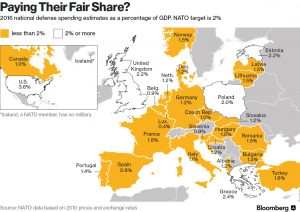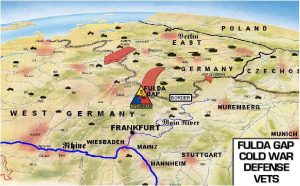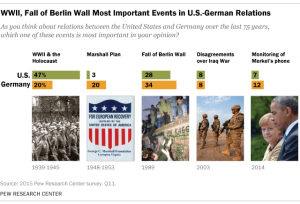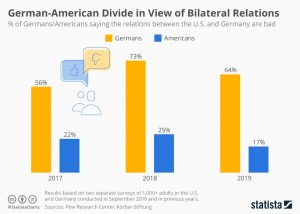A few weeks ago President Trump ordered the removal of about 12,000 American troops from Germany, leaving about 24,000 still on the ground there.
About half of the troops being withdrawn will return to the U.S. The rest will be redeployed to other NATO member nations such as Belgium, Italy, Poland, and perhaps a few Baltic countries.
This move by President Trump infuriated German Chancellor Angela Merkel because she insists removing the 12,000 Americans will not only weaken the NATO alliance but will hurt the German economy because many businesses that serve U.S. bases will be shuttered.
Before all of this happened, however, Germany concluded (over stringent American objections) an enormous natural gas deal with Russia that is currently under some U.S. sanctions. Russian energy exports to Germany are said to earn Russia $10 billion a year, with a likely doubling of that income once additional pipelines to Germany are completed.
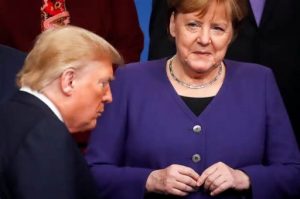
While that deal angered Trump because he wanted Germany to buy its natural gas from the U.S., the main impetus for his extraction of American troops is this: Six years ago, all NATO members pledged to spend 2 percent of their GDP on defense. Yet only eight of 30 so far have kept their word. Germany spends only about 1.4 percent of its GDP on defense.
As NATO’s largest, wealthiest, and most powerful European member, it sets the example for the rest of the alliance. Why should other NATO nations pony up 2 percent if Germany won’t?
Of course, President Trump doesn’t see it that way. Hence, the withdrawal of those 12,000 soldiers.
When I served in what was then West Germany in the 1960s during the height of the Cold War there were 250,000 American troops based there, along with another 100,000 or so French and British forces.
For those who do not know what the Cold War was (or who might have forgotten), it was an ideological conflict between the two world superpowers, the United States and the Soviet Union that began in 1947 after World War Two and ended officially in 1991.
World War II left Germany a defeated and shattered land. Britain and France were drained and exhausted. America, which had remained intact during WW II, kept occupation troops in Germany until 1952. After that, under the auspices of NATO (North Atlantic Treaty Organization), the U.S. kept a quarter million troops in Germany.
NATO, an intergovernmental military alliance between 30 North American and European countries, was created in 1949. It is a system of collective defense in which its independent member states agree to mutually defend one another in response to an attack by any non-member nation.
With NATO in place, Germany quickly became the epicenter for the global conflict between Communism and Democracy, with East Germany a Soviet outpost and West Germany an American satellite. To say Germany was a tense place during the Cold War is putting it mildly.
To keep the Soviet and Warsaw Pact nations (Hungary, Czechoslovakia, Poland, Yugoslavia, Romania, and East Germany) in check, American, French, and British troops were spread out from the North Sea to Germany’s southern border with Switzerland and Austria.
But the focal point was something called the Fulda Gap, an area between the Hesse-Thuringian border and Frankfurt am Main. The gap consisted of two corridors of lowlands through which tanks could quickly move in a surprise attack by the Soviets and their Warsaw Pact allies.
It is named for the town of Fulda, which is nestled at the base of a natural gap in the hilly wooded terrain of West Germany. The Gap was strategically important because this is the corridor that the Warsaw Pact forces and the Soviet Union would have likely taken to invade Europe and cross the Rhine River.
For that matter, it might still be, though most military experts say in the improbable event that Russia attacks Europe the hot spot will not be the German border, but a more likely route will be from the east through the Baltic States or along the Russian border with Poland.
But in 1963, the Fulda Gap, which is just over an hour northeast of Frankfurt, was considered Ground Zero for both an attack and a nuclear war. It was something that was always on our minds because it meant that we would be thrown into the breach as cannon fodder.
As author Robert Kern wrote in his book, We Were Soldiers, Too:
“The brave men and women who served in West Germany were the first line of defense against the enemy horde that would come through the Fulda gap if hostilities ever began. Their mission was to hold that advancing horde for forty-eight hours until reinforcements arrived. None of them was expected to survive an invasion and they all knew it. This was what they had enlisted for, it was their job, and they did it proudly.”
How times have changed.
When I arrived in West Germany with the Army Security Agency in 1963, it wasn’t even twenty years since World War II ended. The scars of that horrendous conflict were still visible everywhere in Germany. Almost every city still had a few Bombed-out buildings and you could meet veterans of Germany’s World War II Wehrmacht in just about every bar and Gasthaus.
Fourteen of us lived in a small top-secret detachment in Bavaria and spent our time monitoring radio traffic between Eastern Bloc military units, listening for any sign that an attack was imminent. The 44 years between 1947 and 1991 were years of uncertainty when the concept of Mutually Assured Destruction (MAD) hung over the world like a fissionable hammer supported by a few frayed filaments.
It was an anxious, uneasy time and the men and women who served in Germany were on the front lines. They would be the first to fight and first to die and they were told as much by their commanders.
Today, with American troops leaving, Germany is a very different country. When I was stationed there, I felt welcome and I formed many lasting friendships with Germans. My wife is German. We speak German together. My two daughters are bi-lingual and one has dual American/German citizenship.
I was sad to see recently that polls revealed Germans now are more anti-American than any other nation in Europe. And while about 75 percent of Americans believe the U.S. still has a good relationship with Germany, only about a third of Germans feel that way about the U.S.
Nearly half the German population in some polls want U.S. troops out.
It looks like they are getting their wish.
And frankly, I agree with both those Germans and President Trump. Why should the United States spend billions every year to maintain a military presence in a country that annually registers a $55 billion to $70 billion trade surplus with the United States and which imposes lop-sided tariffs and duties on American products?
The answer? We shouldn’t. And there you have it.
Auf Wiedersehen, Germany.

